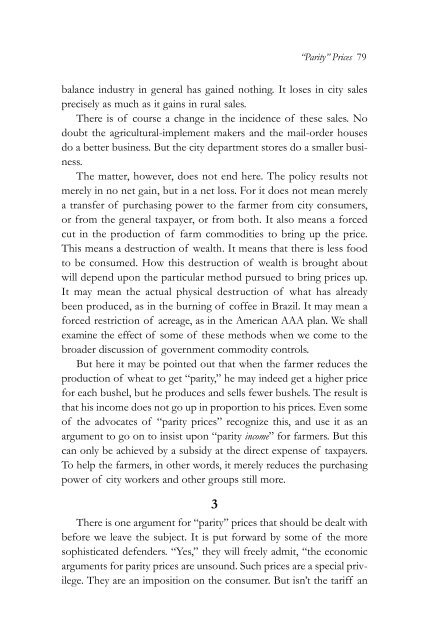1gDdM7w
1gDdM7w
1gDdM7w
- No tags were found...
Create successful ePaper yourself
Turn your PDF publications into a flip-book with our unique Google optimized e-Paper software.
“Parity” Prices 79balance industry in general has gained nothing. It loses in city salesprecisely as much as it gains in rural sales.There is of course a change in the incidence of these sales. Nodoubt the agricultural-implement makers and the mail-order housesdo a better business. But the city department stores do a smaller business.The matter, however, does not end here. The policy results notmerely in no net gain, but in a net loss. For it does not mean merelya transfer of purchasing power to the farmer from city consumers,or from the general taxpayer, or from both. It also means a forcedcut in the production of farm commodities to bring up the price.This means a destruction of wealth. It means that there is less foodto be consumed. How this destruction of wealth is brought aboutwill depend upon the particular method pursued to bring prices up.It may mean the actual physical destruction of what has alreadybeen produced, as in the burning of coffee in Brazil. It may mean aforced restriction of acreage, as in the American AAA plan. We shallexamine the effect of some of these methods when we come to thebroader discussion of government commodity controls.But here it may be pointed out that when the farmer reduces theproduction of wheat to get “parity,” he may indeed get a higher pricefor each bushel, but he produces and sells fewer bushels. The result isthat his income does not go up in proportion to his prices. Even someof the advocates of “parity prices” recognize this, and use it as anargument to go on to insist upon “parity income” for farmers. But thiscan only be achieved by a subsidy at the direct expense of taxpayers.To help the farmers, in other words, it merely reduces the purchasingpower of city workers and other groups still more.3There is one argument for “parity” prices that should be dealt withbefore we leave the subject. It is put forward by some of the moresophisticated defenders. “Yes,” they will freely admit, “the economicarguments for parity prices are unsound. Such prices are a special privilege.They are an imposition on the consumer. But isn’t the tariff an


